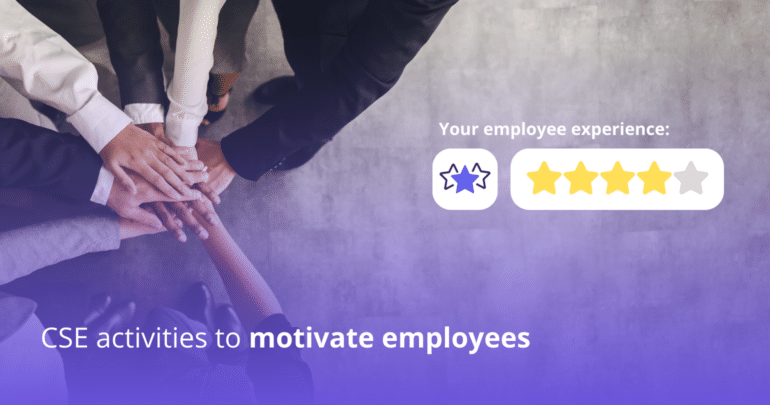In the complex and evolving world of business in France, there is a crucial entity that ensures the balance between employers and employees: the Social and Economic Committee, abbreviated as CSE.
The CSE is not a uniform entity but rather an adaptive structure that takes on different forms depending on the size and structure of the company. Indeed, it is established in companies with at least 11 employees, in economic and social units (UES), or at an inter-company level. To better understand its functioning, it is important to note that in companies with at least 50 employees and at least two distinct establishments, both establishment-level CSEs and a central company-level CSE exist. This implementation varies depending on the specific needs of each company, and this is where the complexity and diversity of the CSE begin to take shape.
Its main missions are:
- Representing employees on various subjects such as working conditions and the company’s strategic direction.
- Managing social and cultural activities within the company, such as social initiatives, sports activities, and festive events.
- Ensuring the health and safety of employees at work.
The CSE is also available to employees for consultation before making important decisions or for questions related to professional training.
The CSE: A Motivational Engine for Employees
This committee plays an essential role in the company as a representative of employees and a guarantor of social dialogue. Its various missions motivate employees and encourage them to give their best, allowing them to participate in:
- Creating a climate of trust and recognition: The CSE can enable employees to communicate openly and transparently with the company’s management.
To facilitate this, Beekast offers sessions and activities anonymously. Anonymity helps encourage open and safe spaces where your employees can express their opinions and concerns without fear of negative consequences. This promotes a more open, inclusive, and productive work environment and allows your employees to feel valued within their organization.
The CSE also actively recognizes employees’ exceptional contributions by highlighting their achievements through reward programs or recognition ceremonies.
- Promoting well-being and quality of work life: The benefits offered by the CSE, such as gift vouchers, summer camps, or meal vouchers, contribute to creating a work environment that fosters employee well-being and quality of work life.
The CSE can go beyond these crucial functions by organizing various well-being-focused activities, such as relaxation sessions or stress management workshops. This holistic approach demonstrates how the CSE plays a central role in creating a positive and fulfilling work environment that benefits both employers and employees!
To measure this well-being, a QWL (Quality of Work Life) survey can be conducted to assess if employees are satisfied with their working conditions and to gather their improvement suggestions. Use Beekast to plan your QWL survey!
By anonymizing your activities, participants feel more comfortable sharing their views and opinions on sometimes sensitive topics. Take advantage of Beekast to create anonymous surveys and forms in just a few minutes! Discover now how to measure the engagement and well-being of your employees to enhance their experience continuously. - Promoting team cohesion and team spirit: The CSE can work with the company to create a positive work environment where employees feel fulfilled and motivated. This can include initiatives focused on employee well-being, recognizing efforts, and promoting a positive corporate culture.
Thus, CSE members can also plan training workshops or mentoring sessions to facilitate the sharing of skills and knowledge among team members.
Furthermore, CSE activities such as team-building events can be organized to strengthen bonds among employees and promote team cohesion. Encouraging communication and exchange facilitates conflict resolution and contributes to creating a positive and fulfilling work environment. - Fostering creativity and innovation: The CSE can also organize forums and brainstorming sessions where individuals from different departments, hierarchical levels, or cultural backgrounds are invited to share their ideas and suggestions.
The CSE can arrange events focused on creativity, such as innovation workshops, hackathons, or idea contests. These initiatives promote employee collaboration, stimulate their original thinking, and encourage them to find innovative solutions.
Thus, it can establish incentives for innovation, such as special recognition or in-kind benefits, which can stimulate employees’ creativity and encourage them to propose innovative ideas. - Enhancing employee engagement and retention: The CSE works closely with the entire administration of an organization as well as the HR department to ensure the best working conditions for employees.
In this regard, offering training and development opportunities to employees is conceivable. This shows that you value their growth and progression, which motivates employees to remain engaged and attached to the company!
Additionally, the CSE can support initiatives to establish a harmonious work-life balance, such as flexible working hours or telecommuting policies.
Systematically integrating CSE (Employee Social and Economic Committee) activities within your company is of strategic importance for several essential reasons. Firstly, these activities provide moments of relaxation and camaraderie, allowing your employees to recharge.
But that’s not all! These initiatives also reflect your company’s deep commitment to the well-being and personal fulfillment of your employees. In doing so, you foster a harmonious and inspiring team cohesion that can significantly enhance your company’s overall performance and make it more competitive.
By regularly incorporating these activities into your professional environment, you can also enhance your reputation as an attractive employer. This can attract new talent and strengthen the loyalty of your current team. Remember that happy and engaged employees are an invaluable asset for your company’s reputation and long-term success!
Also Read:
